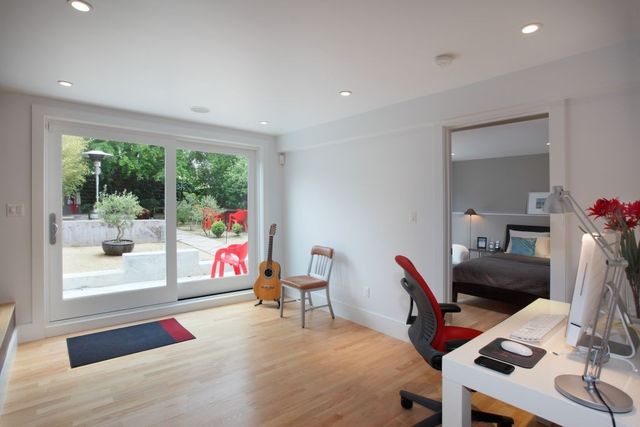
Your garage can be transformed into a home cinema. It is an exciting project that can give you the best movie-watching experiences. It will also make your home a comfortable place for you and your loved ones. Before you start thinking about converting your garage into a home theater, here are some important things to keep in mind.
How to Choose the Best Equipment for Your Garage Theatre
You can create a wonderful theater by making sure your space is well-insulated. You can block out the noise by using high-quality paint and ceilings. Acoustic panels or other soundproofing materials are also helpful.
Having the correct equipment in place can also make a big difference in how much you enjoy your new theater space. A projector is necessary if you plan to use your media room to watch movies. A projector allows you to view what you are watching in a larger and more cinematic format.
Also, great cinema experiences are possible only if you have a quality sound system. A sound system should be installed in your theater. The contractor must know how to use it efficiently and correctly.

One of the most important aspects of a good sound system is the location of speakers. The best place to install the speakers is a central position in your media room, as this will provide you with better sound than if you have speakers spread throughout the room.
To make your theater truly cinematic, you will need a screen, projector, speaker system, and a sound system. These items will greatly enhance your garage-to-home theater conversion and be well worth the money you spend on them.
You'll need to find a reliable installer that can help you with all of the details. They will help to find the perfect projector, screen and speakers for you new theater.
Having the right equipment can be expensive, so it's wise to do your research ahead of time. This will help you avoid poor choices and make sure that your space suits your needs.
Take a look at your options
There are many ways you can turn your garage into entertainment space. It all depends on the size of your house. There are many fun and creative ideas you can use to transform your garage into an entertainment room.

A garage can be transformed into a media room if you are looking to save money. This option can be great addition to your house and an economical alternative to having a brand new room built.
Valerie Loor was looking for a solution that would provide them with both media and gathering space in the garage. They wanted a place they could watch movies in, but also space to host friends and family.
FAQ
What's the difference between a remodel or a renovation?
Remodeling is making major changes to a particular room or area of a given room. A renovation refers to minor changes made to a particular room or area of a given room. A bathroom remodel can be a large project while an addition to a sink faucet can be a small project.
A remodel involves replacing an entire room or part of a whole room. A renovation is merely changing something in a particular room. Kitchen remodels can include changing countertops, sinks, appliances and lighting. But a kitchen update could include painting the wall color or installing a new light fixture.
Why should I remodel rather than buying a completely new house?
While houses may get more affordable each year, the square footage you pay is still the same. You may get more bang for your buck but you still have to pay for extra square footage.
It's cheaper to maintain a house without much maintenance.
Remodeling can save you thousands over buying a new house.
By remodeling your current home, you can create a unique space that suits your lifestyle. You can make your home more welcoming for you and your loved ones.
How can I tell if my home needs to be renovated or remodelled?
You should first check to see if your home has had any recent updates. A renovation may be a good idea if there have been no updates for several years. However, a remodel might be the best option for you if your home seems brand-new.
A second thing to check is the condition of your house. A renovation is recommended if you find holes in your drywall, peeling wallpaper, or cracked tiles. However, if your home looks great, then maybe it's time to consider a remodel.
Also, consider the general condition of your property. Is your house structurally sound? Do the rooms look nice? Are the floors spotless? These questions are critical when deciding what type of renovation you should do.
What is the difference between building a new home and gutting a current one?
Gutting a home involves removing everything within a building including walls and floors, ceilings as well as plumbing, electrical wiring, appliances, fixtures, and other fittings. Gutting is done when you want to make some modifications before moving in. Because of the many items involved in gutting a house, it is usually very costly. The average cost to gut home ranges from $10,000 to $20,000, depending on your job.
The process of building a home involves the construction of a house from one frame to another. Next, the builder adds walls, flooring and roofing. This usually happens after you have purchased lots of lands. Building a home usually costs less than gutting and can cost between $15,000 and $30,000.
When it comes down to it, it depends on what you want to do with the space. You'll need to spend more if you plan to gut your home. If you're building your home, however, you don't have to tear everything down and start over. Instead of waiting for someone else, you can build it how you want.
How much is it to renovate and gut a whole kitchen?
You might be wondering how much it would cost to renovate your home.
A kitchen remodel will cost you between $10,000 and $15,000. There are many ways to save money and improve the overall feel of your kitchen.
You can cut down on costs by planning ahead. This includes choosing the design style and colors that best suits your budget.
Hiring an experienced contractor is another way of cutting costs. A skilled tradesman will know exactly what to do with each stage of the construction process. This means that he or she won’t waste time trying out different methods.
It's best to think about whether you want your current appliances to be replaced or kept. The cost of replacing appliances can increase by thousands of dollars in a kitchen remodel project.
It is possible to choose to buy used appliances, rather than buying new ones. A used appliance can help you save money as you won't be charged for installation.
Finally, you can save money by shopping around for materials and fixtures. Many stores offer discounts for special occasions like Cyber Monday or Black Friday.
What is it worth to tile a bathroom?
You might want to go big if you are going to do it yourself. A full bathroom remodels an investment. When you consider the long-term benefit of having a beautiful space for many years, it is a smart decision to invest in quality fixtures and materials.
You can make a big impact on how your room looks. Here's how to choose the right tiles for your home, regardless of whether it's a small renovation or major project.
Decide the type of flooring that you want to install. The most common options are ceramics, stone, porcelain, and natural timber. Next, pick a style like classic subway tiles or geometric designs. Next, choose a color palette.
You'll probably want to match the tile to the rest of the room for a large bathroom remodeling job. For example, you may opt for white subway tile in the kitchen and bath area while choosing darker colors in other rooms.
Next, decide the scope of the project. Is it time for a small update to the powder room? Or, would you rather have a walkin closet in your master bedroom?
After you have established the project's scope, it is time to visit local stores and view samples. This will allow you to get a feel for how the product is assembled.
Finally, shop online for great deals on ceramic and porcelain tiles. Many retailers offer discounts for bulk purchases and free shipping.
Statistics
- 55%Universal average cost: $38,813Additional home value: $22,475Return on investment: 58%Mid-range average cost: $24,424Additional home value: $14,671Return on investment: (rocketmortgage.com)
- About 33 percent of people report renovating their primary bedroom to increase livability and overall function. (rocketmortgage.com)
- Attic or basement 10 – 15% (rocketmortgage.com)
- 5%Roof2 – 4%Standard Bedroom1 – 3% (rocketmortgage.com)
- Windows 3 – 4% Patio or backyard 2 – 5% (rocketmortgage.com)
External Links
How To
Is a permit required for home renovation?
It is important to do the right thing when renovating your house. Every construction project that affects the exterior walls of your property requires building permits. This covers adding on, remodeling, or replacing windows.
There could be serious consequences if your decision to renovate your house without a building permit is made. If you are responsible for injuries sustained during the renovations, you could face penalties or even legal action.
It is required that all persons working on residential structures obtain a building permits before they start work. Many cities and counties require that homeowners apply for a building permit prior to beginning any construction project.
Building permits are usually issued by local government agencies like the city hall, county courthouse or town hall. However, they can also be obtained online and by telephone.
It would be best if you had a building permit because it ensures that the project complies with local safety standards, fire codes, and structural integrity regulations.
A building inspector, for example, will check that the structure meets all current building code requirements. This includes proper ventilation, fire suppression, electrical wiring, plumbing and heating.
In addition, inspectors will check to ensure that the planks used to construct the deck are strong enough to support the weight of whatever is placed upon them. Inspections will also check for cracks or water damage that could cause structural instability.
Once the building permit is approved, contractors can proceed with the renovations. However, if the contractor fails to obtain the necessary permits, he or she could be fined or even arrested.